



 |
  |
 |
|
Joe Yamanaka Hiro Yanagida Yancy Derringer Yazbek |
Ybo² Yeti Yonin-Bayashi |
Takuro Yoshida You You am I |
Cathy Young Paul Young Yum-Yum |
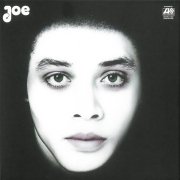 |
Joe (1974, 41.42) **½/T |
|
| Look Into My Eyes Call My Name I Wanna See You Don't Stay Away Theme From "Proof of the Man" Blue Morning 28.8.1972.Sat. I Only Want to Say Goodbye |
Point of No Return Two People Together |
|
Current availability:
Mellotron used:
Akira "Joe" Yamanaka (1946-2011) is best known as vocalist for legendary Japanese psychsters Flower Travellin' Band, making his solo debut, 1974's Joe's blandness all the more surprising. Think: pre-psych '60s American pop and you won't be too far off the mark, at its least dull on the bluesy, Hammond-driven Theme From "Proof Of The Man" and I Only Want To Say Goodbye.
Nobuhiko Shinohara plays Mellotron on two tracks, with background chordal strings and flutes on Call My Name and strings on closer Two People Together, to no great effect. Consummately professional, yet utterly boring. What a waste of talent.
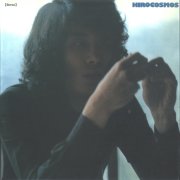 |
Hirocosmos (1973, 38.44) ***½/T½The Sea of TempestOde to Taurus Breaking Sound-Barrier Happy Cruise Rockomotion Uncertain Trip Time for Reverie |
Current availability:
Mellotron used:
It seems Hiro Yanagida was the keyboard player for Foodbrain and Love Live Life + One, amongst others, kicking his solo career off with 1970's Milk Time. Hirocosmos was apparently his fourth solo and can be summed up in one word: fusion. Various jazz/rock styles are covered, although Yanagida's probably at his best when delivering fiery, Mahavishnu-type stuff, as on Rockomotion or The Sea Of Tempest when it gets going, although the album contains more of his reflective material along the lines of Time For Reverie.
His keyboard work is fairly astounding, with some absolutely blistering Moog work on several tracks, along with the ubiquitous Rhodes. He plays Mellotron on two tracks, with some stupidly fast Mellotron flute work on Breaking Sound-Barrier; no idea how he played that without loads of key-click, missed notes etc. Talent, I suppose. Anyway, more flutes and strings on Happy Cruise, although that would appear to be it.
So; Japanese fusion, anyone? Given that the prevailing ethos in the country at the time seemed to be more psych-based, this was probably quite a brave move, although I'm sure the better-known American bands of the era did a lot to popularise the crossover. Anyway, this is a decent enough album in the style, with two fairly good Mellotron tracks, although probably not essential.
See: Neco
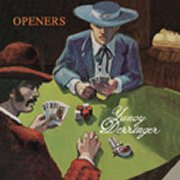 |
Openers (1975, 41.17) **½/TPass the WineRocket Roll Aero Plane I Thought Alot Today Welcome on Standing on the Edge Weedburner |
Current availability:
Mellotron used:
Yancy Derringer's sole album, Openers (a self-titled debut appears to be a chimera), is no more or less than an utterly average, mid-'70s Midwest hard rock album, I'm afraid. Actually, the album title sort of gives away its debut status really, doesn't it? Anyway, Pass The Wine is turgid boogie, ditto Rocket Roll, while the grammatically-horrible I Thought Alot Today is a so-so bluesy effort, with all concerned displaying as much originality as a bunch of R.E.O. Speedwagon outtakes from their hard rock days. Yup, their outtakes. The album only really picks up at all on the last track, the actually not bad Weedburner (what ARE they talking about?), although it's a long way from the 'classic' I'd heard it was, leaving this sitting firmly in the 'clunker' zone, I'm afraid; I really have no idea why Gear Fab thought it was worthy of reissue.
Vocalist/keys man C.F. 'Charlie' Kuchler plays bog-standard piano and organ on most tracks, although his synth (gotta be a Mini!) work is actually quite interesting, with a sound on Weedburner that isn't a million miles away from what Devo were about to unleash on the world a state or two away. Mellotron on one track only, with strings towards the end of I Thought Alot Today, although (that phrase again) nothing you can't live without. No, really.
So; big in Wisconsin? Probably big somewhere, but not in my house; I really can't imagine playing this again, other than as a 'how mediocre is this?' demo. It only gets the extra half star for one OK song (Weedburner) and some passable synth patches. Save your money. Having set up a regular savings plan, avoid this album, too. Incidentally, for what it's worth (not an awful lot, actually), Yancy Derringer morphed into the new-wavish The Vers eventually, who sound like they were probably a bit of a riot live (according to, er, their own website), almost certainly unlike the original band.
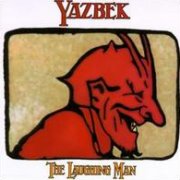 |
The Laughing Man (1996, 42.48) ****/T |
|
| Welcome to My World Black Cowboys on the Beach Monkey in the Middle No More Tomorrow Fight the One-Armed Man Only Dreaming Surface Tension |
Pinnochio's Nose The Wind 666 Mississippi Honeymoon |
|
Current availability:
Mellotron used:
David Yazbek is an accomplished musician, with many TV and Broadway credits to his name, not to mention several solo albums in a more pop/rock vein. The superb XTC are not only a major influence, but collaborators, as Andy Partridge has chipped in on one of Yazbek's TV show soundtracks, not to mention playing on his solo debut (credited to just 'Yazbek'), The Laughing Man. In fact, imagine an American XTC and you're pretty much there, which is meant as a compliment. Just about every track has one of those beautiful songwriting twists you'll hear on all the best powerpop records (think: Big Star or Jellyfish), while Fight The One-Armed Man even features a sly two-line quote from Queen's We Will Rock You, for some reason.
'Melletron' on one track only, with a cello line on closer Mississippi Honeymoon repeating throughout the song that sounds a little like it could've been played once, sampled, then sequenced. Or not. Fight The One-Armed Man also has a string line (Yazbek is credited with 'keyboards') that sounds slightly Mellotronlike, but I wouldn't put money on it. So; good album, quite unexpectedly, but don't bother for the Mellotron.
 |
Alienation (1986, 44.36) ***/TTAmerikaRyōkiuta Boys of Bedlam To Be (Teikokunogyakushū) Heavy Waters Ural |
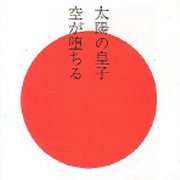 |
Taiyo no Ouji (1986, 31.42) ***/TTaiyo no Oujii) Here Comes the Sun, Here Comes the Flood ii) Horus iii) On the Way to Heaven's Eye Why......? Amerika (extended long playing) |
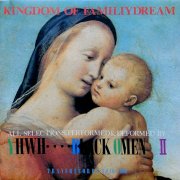 |
Kingdom of Familydream (1986, 36.18) ***½/TTDie VerwandlungKingdom of Familydream I Kingdom of Familydream II Deadhuman's Paradise Universe Springfield Lovery on the Water |
 |
Hikari no Kuni (1987, 15.08) ***½/TT½Hikari no KuniLiving in Labyrinth Seasons |
 |
Pale Skin, Pale Face (1988, 74.03) ***½/TT |
|
| Landed Howl, Bark & Cry Sahara Sunrise The Plague System of Making Paranoia Rubycon Gravity Tsubura |
Oni Fracture of Meaning By the Lake El Salvador Lunar Animal |
|
 |
Starship (1989, 39.17) ***½/T½StarshipPrecious Canon (How Long Must Singin' This Song?) Furan Jitensha Otoko Worn-Out Music Round Dance |
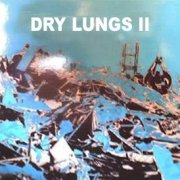 |
Dry Lungs II (1986) ***/TT[Ybo² contribute]Trash! Crash! |
Current availability:
Mellotrons used:
Ybo² are remembered mostly today (if at all) for being the fertile soil in which several later Japanese avant-noise bands put out their first shoots, not least K.K. Null and Tatsuya Yoshida/Ruins. Anyone expecting typical Japanese '80s prog, or, for that matter, typical anything, should turn away now. 1986's Alienation (they ain't kiddin') opens with the twelve-minute noise-fest Amerika, while track two intercuts the row with snippets of symphonies, choral works and the like, probably done with old-fashioned tape splicing. The material levels off a bit nearer the end of the album, with closer Ural being (almost) a 'normally'-structured song, albeit in a disjointed, evil funk kind of way. The trio's least well-known member, bassist Masashi Kitamura plays dying Mellotron strings on Amerika, Boys Of Bedlam (also a single) opens with a dusty cello part and the album closes with a few more seconds of dying strings and surprisingly non-dying cello at the end of Ural.
The same year's EP, Taiyo no Ouji, starts off in a vaguely melodic way, fairly quickly descending into a maelstrom of noise, particularly on side two's extended version of Amerika, seventeen minutes of, frankly, unholy racket. Kitamura on Mellotron again, with a surprisingly tuneful string part, all things considered, on the first part of the opening title track, Here Comes The Sun, Here Comes The Flood. Kingdom of Familydream appeared towards the end of '86, essentially more of the same, opener Die Verwandlung beating the listener about the head with an iron bar, although Kingdom Of Familydream I is about as gentle and melodic as the band ever got. On the other hand, Kingdom Of Familydream II sounds like '74 Crimson on particularly bad acid, skronky Mellotron strings and all, Deadhuman's Paradise rips off a track from Budgie's Squawk and closer Lovery On The Water (yes, it's actually spelled like that on the sleeve) is a slightly more 'conventional' Crimson/psych crossover thing. The album's other Mellotron use includes faint strings on Kingdom Of Familydream I, additional flutes on Kingdom... II and a flute part on Lovery On The Water, making this possibly the band's most satisfying release.
1987's Hikari no Kuni EP is one of their more accessible (I use the term exceedingly loosely) releases, its three tracks all quite different to each other, the Japanese-psych-gone-bad of the title track contrasting sharply with the Crimsonisms of Living In Labyrinth and the heavy psych/Eastern folk hybrid Seasons. Kitamura's Mellotron is obvious on two tracks, with strings and flutes warbling all over Hikari No Kuni itself and a lengthy flute part on Seasons, although the unison guitars in the dying seconds of Living In Labyrinth just might be guitar and Mellotron, too. The following year's double Pale Skin, Pale Face is more of the same, only twice as long, at its best on The Plague, System Of Making Paranoia, Tsubura and ten-minute closer Lunar Animal. Kitamura isn't credited with Mellotron specifically, but the three tracks on which he's credited with keyboards all turn out to be the Great White Beast, with an upfront high cello part on Howl, Bark & Cry, distant strings on The Plague and mad strings on Lunar Animal, while Yuko Iwahori adds a high flute line to Tsubura. Might this be Ybo²'s crowning achievement?
The last of the band's Mellotron releases is 1989's Starship, a very different album to the material they were producing all of three years earlier. There's still a noise element lurking in the background, but by and large, this is a tuneful psychedelic album, albeit in a coming-out-of-Japanese-noise kind of way, with operatic female voices, guitar solos and digital synths a-plenty. (Presumably still) Kitamura on Mellotron, with some skronky string chords (are there any other kind in Ybo²land?) on the opening title track, volume pedalled-(female?) choir chords on Canon (How Long Must Singin' This Song?) and suitably worn-out strings on Worn-Out Music.
All in all, Ybo² are pretty cracked, but if you think you can handle it, they're worth it in places, largely for the Mellotron. As to whether or not any of these are currently available in any way, shape or form, I've no idea, but with Japanese stuff, you never know.
See: Dry Lungs II | Masashi Kitamura + Photogenix | Differance
Yes (UK) see: |
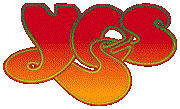 |
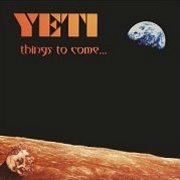 |
Things to Come... (2000, 47.02) ***/TT½Two FingersInterstellar Biplane Go Like This Est Mort |
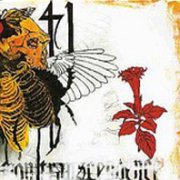 |
Volume, Obliteration, Transcendence (2004, 53.09) ***/TT½The Cusp of Something You Don't UnderstandStrangled By Light Blood Lotus Black Pills |
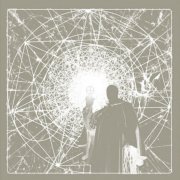 |
12"/CD-R (2006, recorded 2000, 18.19) ***/T½ The Man With the Lamp |
Current availability:
Mellotrons used:
Texans Yeti coalesced in 1998 out of two existing bands, adding keyboard player Doug Ferguson from Ohm, with whom he played contemporaneously. Their sound is probably best described as a straight cross between instrumental progressive and space rock, with elements of electronic music thrown into the melting-pot and, er, a touch of Cardiacs, of all bands. Their first recorded work was a two-track CD-R demo, Demonstration CDR (reviewed here), containing early versions of two of the four tacks on their proper debut, 2000's Things to Come....
It's probably not the most impressive effort ever in the (admittedly small) field, being a bit heavy-handed (maybe that was the intention?), but it's not a bad piece of work, particularly opener Two Fingers. The album's chief problem lies in the rather subjective view that if the virtual needle is dropped at any random point over its length, it sounds fantastic, but listening to 47 minutes of it's a bit of a chore. You've got the sound spot-on, guys, now just write some tunes to fit into your format. Ferguson (who tragically died in early 2002) played Mellotron, amongst other keys, with occasional choirs on Interstellar Biplane and Go Like This, leaving the sixteen-minute Est Mort as the nearest the album gets to a full-on Mellotron track, with choirs, strings and flutes battling it out at different points of the 'song'. Tragically, Ferguson died in early 2002
After another demo set, er, Demonstration CDR II (reviewed on the same page as its predecessor), the post-Ferguson band released their second and to date, latest 'regular' album, 2004's Volume, Obliteration, Transcendence. This is a noisier proposition than its predecessor, although it still features long passages of spacey electronics. I don't know whether the band's evident anger is related to Ferguson's untimely death or not, but the distorted, shouted vocals to be heard on a couple of tracks are clearly railing against something. Bassist Tommy Atkins takes over on Mellotron (Ferguson's?), with choirs on The Cusp Of Something You Don't Understand, more of the same and strings on Strangled By Light, including an über-sustained note at the end, switching between octaves and choirs on (very) lengthy closer Black Pills.
According to its sleevenotes, The Man With The Lamp one-sided 12"/CD-R (recorded early 2000) was 'originally submitted to be a split 12" with Subarachnoid Space'; I don't know the story behind it, but I'd take a guess that the project never happened, so Yeti put their contribution out anyway. Its eighteen minutes shift through several stylistic changes, from crazed electronica through doomy, Wurlitzer piano-led naval contemplation to full-on King Crimson, while Ferguson bookends the piece with his Mellotron work, kicking off with skronky, unaccompanied strings and choirs, with brass, string and choir parts appearing towards the end of the piece.
So; while not the easiest listen ever, these should appeal to many space-rock types looking for something a bit darker and more structured than their usual fare. Passable amounts of Mellotron on both, but given Ferguson's posthumous reputation, I'd expected a little bit more. There are a couple more Yeti releases, 2000's Live at the Sockmonkey CD-R and 2004's Live DVD, er, DVD. I'd imagine they used Mellotron on both, so I'll come back to these should I track copies down.
See: Unreleased | Ohm
 |
Ishoku-Sokuhatsu (1974, 34.42) ***½/T[hΛmǽbe Θ]Sky and Cloud Festival Dangerous Situation The Sadness of a Ping-Pong Ball |
Current availability:
Mellotron used:
I think Ishoku-Sokuhatsu was Yonin-Bayashi's second album, though mostly Japanese-language discographies (which is fair enough, really) cloud the issue for the average Englishman. Their sound, at least in the studio, fell somewhere between early-'70s hard rock and a sort of drifting post-psych stuff, laid-back but quite inventive; it hasn't dated fantastically well, but is far superior to some of their contemporaries, not least the very average Too Much. The album consists of a short burst of noise, title untranslated, followed by four pieces, two quite lengthy, including some jamming, although the energy level rarely picks up above 'sedate', which shouldn't be read as any sort of criticism.
Keyboard player Hidemi Sakashita plays mostly Hammond and Rhodes, although he turns to the Mellotron for both Sky And Cloud, with a high-end string line and The Sadness Of A Ping-Pong Ball, with a more conventional part. Nothing outstanding, but always nice to hear. The CD adds four bonus live tracks, including the excellently-titled My Brother Flied With An UFO, that constitute another album in themselves, although there's no Mellotronic input - suspect a studio machine.
 |
Ōinaru Hito (1977, 40.07) **½/T |
|
| Ano Musume ni Aetara Mirai Kanparisōda to Furaidopoteto An Do∼u Torowa (Bai Bai Kyandīzu) Rangyō Kanashī Kimochi De Oideyo Anata o Aishite |
Ōinaru Uta ni wa Naranaikeredo |
|
Current availability:
Mellotron used:
Given Japanese artists' insane workloads, it shouldn't be surprising that Takuro Yoshida's 1977 album, Ōinaru Hito, was something like his twelfth album of the decade, with several to go. Its contents consist of thoroughly ordinary Japanese-language pop/rock, with a high ballad-to-upbeat quotient, probably at its least anodyne on Rangyō and the Beatlesy Ōinaru.
Hidetoshi Yamada plays Mellotron, with chordal strings on Rangyō and a single descending flute run on closer Uta Ni Wa Naranaikeredo, neither of which makes this worth hearing in any realistic use of the term. File under 'Japanese mainstream'. And that "I am smoking a fag" cover pic dates this appallingly.
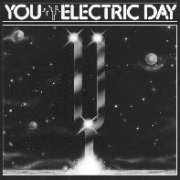 |
Electric Day (1980, 41.05) ***½/TElectric DayMagooba Son of a True Star Sequential Spectrums Part 1 Sequential Spectrums Part 2 Slow Go Zero-Eighty-Four |
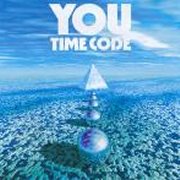 |
Time Code (1983, 41.29/51.42) ****/TTT½ (TTTT) |
|
| Time Code Future/Past 20/11/28 Deep Range Taurus-Fantasia Metallique Live Line Bluewater Dream |
Mission: Possible [CD adds: Controlled Demolition Zone Black] |
|
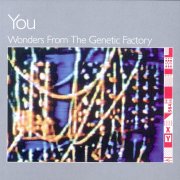 |
Wonders From the Genetic Factory (1984, 46.40/71.08) ***½/TTAxisIsotopic Moments Europe Transfer Future Generation Sampling Dance Yourovision [CD adds: Koyaanisqatsi Xmas] |
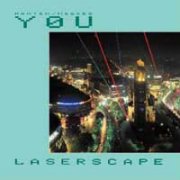 |
Laserscape (1986, 51.35/73.00) ***½/TTTPassing LandscapesCan You Tell Me Where I am Changing Rooms Travelling Hologram Scanned Noises Curious Phenomena Part I Curious Phenomena Part II [CD adds: Laserscape/Live] |
![You, '[00:19:96:00] Electric Images Revisited'](images/you-00199600.jpg) |
[00:19:96:00] Electric Images Revisited (1996, 57.27) ***½/TFire WalkTomorrow Belongs to Those Who Can Hear it Digging in the Universe Dune Voices Alpha Message Strange Invaders Beyond the Sound Barrier Immortal Course |
Current availability:
Mellotrons used:
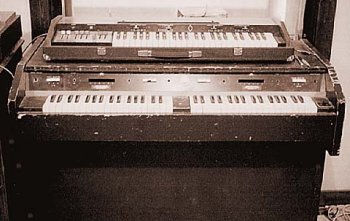 |
|
| photo: Albin Meskes | |
You were (and still are) the German electronic duo of Udo Hanten and Albin Meskes, who first collaborated in late 1978, recording their first album, Electric Day, in 1979, releasing it the following year. The album's far more aggressive than anything the Tangs could deliver, most tracks being energetic sequencer workouts topped with loud, sometimes discordant synths and Ulrich Weber's distorted guitar lines, underpinned by Lhan Gopal's thunderous percussion, something heard relatively rarely in the electronic scene. The one track that stands out for this listener is Slow Go, mostly due to its being the only Mellotron track on the album. Interestingly, it was a studio MkII (right), with Albin and Meskes apparently taking one keyboard each of the two-manual machine, although I'll admit to being unable to hear any rhythm tapes. Maybe it was fitted with two sets of lead tapes? Anyway, it's used extensively near the beginning of the lengthy track, with a few chords finishing the piece off. This means... (quick (Mellotron?) trumpet voluntary) You take over from England as the last-known MkII users before a handful of albums made with refurbished machines in recent years.
You's next release was 1981's Mellotron-free, guitar-heavy Scanner EP, although by '83's Time Code, they'd bought a Novatron that they immediately de-badged, finding the original Mellotron nameplate underneath. The album, while still fairly full-on, is less abrasive than its predecessor, but hardly an easy listen, with tracks like the synthpop-influenced opening title track, the relatively laid-back Future/Past and the heavily sequenced Taurus-Fantasia all rubbing shoulders and getting on amicably enough. Plenty of Mellotron this time round, with insanely upfront choirs on the opening title track, just as upfront strings on Future/Past and church organ (their tape-frame's third sound) on 20/11/28, while Metallique goes for strings and choir, with more strings on closer Mission: Possible. It also turns up on both the CD's bonus tracks, with choirs on Controlled Demolition and strings and choir on Zone Black, making this pretty essential for those who wish to wallow in bubbling mudpits of Mellotron.
Picking up their workrate, You produced another album in '84, Wonders From the Genetic Factory. Despite still largely using analogue equipment, it has a 'pretty contemporary for the time' sound to it and not in a bad way; if anything it's even more upbeat than Time Code, while still having its darker moments. It also features the band's only truly long-form studio piece, the side-long Yourovision, the track that was to re-name the band at a later date. Not so much Mellotron this time round, with a major string part on Europe Transfer and choirs and strings on Yourovision. CD bonus track Koyaanisqatsi Xmas also briefly features a tape-loop of the band's own machine's choir sound, which just about counts for our purposes.
1986's Laserscape carries on in reasonably similar vein to its predecessor, adding Jaime M. Zenamon's classical guitar parts to two tracks, in an unusual move for an electronic outfit. Sounding less and less like the then-current EM orthodoxy has worked in the band's favour with hindsight, allowing them to stand out from the pack, particularly when compared to most of the current crop of 'Berlin School' copycats. More Mellotron than on ...Genetic Factory, with strings, choirs and church organ on opener Passing Landscapes, with more of those 'front of the mix' strings on Can You Tell Me Where I Am and Curious Phenomena Part I, with all three sounds on Part II, although the choirs on Changing Rooms are samples. The CD's bonus track, Laserscape/Live, gets some more (proper M400) strings in, though not enough to bump up the album's T rating.
You mutated into Central Europe Performance in the late '80s, reverting to their original name for 1996's [00:19:96:00] Electric Images Revisited, a compilation of music recorded between 1992-95. The album's equipment list still contains several Oberheims, a MemoryMoog and a Prophet 5, although I suspect a lot of its content is produced by the Korg Wavestation, particularly the more 'ethnic' sounds. Stylewise, this is still quite an in-yer-face kind of electronic album, which makes a welcome change from the kind of new age gloop which is so often served us as 'EM' these days. As You's first (and to date, only) CD-era album, its hour-long, er, length is unadorned with any bonus tracks, but it's pretty complete in itself, really. Just two Mellotron tracks, with a mere handful of string chords on Strange Invaders and rather more of the same on Beyond The Sound Barrier (from guest Ralf Vissers), though hardly their top Mellotron album.
Overall, then, a fine electronic outfit, some distance from the mainstream, with a fair bit of Mellotron use across their five releases. All five are available in the Era box, from 1996, which is probably the easiest way to find them. The band began operating under the name YOUrovision (ho ho) in 2000, but reverted to You (again) in 2009. They're still performing and what's more, are still using their Novatron M400. Hurrah! They keep it maintained via the legendary Klaus Hoffmann-Hoock of Mind Over Matter and Cosmic Hoffmann, so fingers crossed for some new, Mellotron-using You material sometime soon.
See: Central Europe Performance
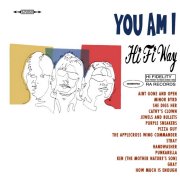 |
Hi Fi Way (1995, 41.42) ***½/TT½ |
|
| Ain't Gone and Open Minor Byrd She Digs Her Cathy's Clown Jewels and Bullets Purple Sneakers Pizza Guy The Applecross Wing Commander |
Stray Handwasher Punkarella Ken (the Mother Nature's Son) Gray How Much is Enough? |
|
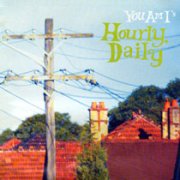 |
Hourly, Daily (1997, 51.50) ***½/T |
|
| Hourly, Daily Good Mornin' Mr. Milk Soldiers Trike Tuesday Opportunities If We Can't Get it Together |
Flag Fall $1.80 Wally Raffles Heavy Comfort Dead Letter Chorus Baby Clothes Please Don't Ask Me to Smile Who Takes Who Home Forget it Sister |
|
Current availability:
Mellotrons used:
On my first trip to New Zealand, in 1999, I was rifling through the CDs in a record shop in Dunedin (as you do), when my ear was suddenly caught by the unmistakable tones of a Mellotron (flutes, I think). Upon asking what we were hearing, I was told, "You am I" and I added them to my list of (then) potential website entries. It seems the Sydney-based band formed in 1989, originally as a rather grungier proposition than their eventual direction, apparently showcased on their '93 debut, Sound as Ever.
Two years later, they released their second effort, Hi Fi Way, having shifted more into the powerpop area, with the occasional rockier number thrown in for good measure. It's actually a damn' good record, full of tracks of the quality of Cathy's Clown (not that one), Jewels And Bullets and Ken (The Mother Nature's Son), with Beatles references both in its title and opening Hard Day's Night chord. Mainman Tim Rogers plays quite a bit of (clearly real) Mellotron on the album, with queasy strings and cellos on opener Ain't Gone And Open, heard warming up at the beginning of the song and very clearly at the end. There's strings towards the end of She Digs Her, complete with unfakeable tape-slip, upfront flutes and background strings on the semi-balladic Purple Sneakers (was this the track I heard in that shop?) and, to finish off, separate string and flute parts on Handwasher.
Another two years on and Hourly, Daily appeared, in a similar vein to its immediate predecessor, with the added bonus that it seems to be a Kinksian concept album about Australian life. Top tracks include the Byrdsian Mr. Milk, Trike and the jaunty Please Don't Ask Me To Smile (is that an uncredited Clavinet I hear?), but again, no actual clunkers. Mind you, the band could be accused of having become slightly too big for their boots, releasing a nearly hour-long album of the kind of material that rarely works well at that length, although its concept format may well be its get-out clause. Like its predecessor, the album opens with a bit of Mellotron, with very audible flutes on the title track, although it's far less evident over the album as a whole, probably partly due to the real strings to be heard on a few tracks. In fact, flutes on last (listed) track, the grammatically-challenged Who Takes Who Home are the only other obvious sighting, the two tracks Mellotronically bookending the record, assuming you ignore the actual last track, the unlisted Forget It Sister.
So; two good powerpop albums, with more Mellotron on the former than the latter. I don't know what the rest of the band's catalogue is like (they're still in existence at the time of writing), or whether they used a Mellotron again, but these two are worth a punt. Incidentally, despite a credit, there's nothing to be heard on their contributions to 1997's Idiot Box soundtrack.
See: Samples etc.
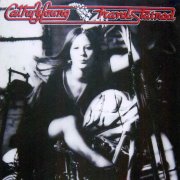 |
Travel Stained (1973, 33.47) **½/T½ |
|
| Intro Cocaine I'm Happy Life in the City Set Me Free I Really Needed Me Eagle Maggie May |
Coming Home Midnight Hour |
|
Current availability:
Mellotron used:
Cathy Young's best known for her debut, 1969's A Spoonful of Cathy Young, but her only Mellotronic release is its follow-up, 1973's Travel Stained. It's a pretty typical singer-songwriter effort of the era, with occasional forays into a rather lacklustre kind of rock'n'roll (Eagle), finishing with a suitably brassy version of Wilson Pickett's (In The) Midnight Hour, none of which makes for particularly essential listening the better part of forty years later.
Fludd's Pete Csanky (later, briefly, of the mighty Saga) plays his rare M300 on the album, with strings all over Maggie May and less of the same on Coming Home. Now that this is actually available again, do you bother? Probably not, frankly, unless you're one of those souls who's captivated by voices, as Cathy Young had a pretty good one. The album's a dullard, though, without enough Mellotron to make it worth the effort.
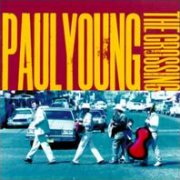 |
The Crossing (1993, 49.39) **/½ |
|
| Hope in a Hopeless World Now I Know What Made Otis Blue Bring Me Home The Heart is a Lonely Hunter Won't Look Back The Only Game in Town Love Has No Pride Down in Chinatown |
Half a Step Away Follow on It Will Be You |
|
Current availability:
Mellotron used:
Paul Young's name will always be synonymous with his biggest hit, his take on Marvin Gaye's Wherever I Lay My Hat (That's My Home), with Pino Palladino's irritating, albeit super-distinctive fretless bass line. By the time that appeared, he'd already worked his way through several pro or semi-pro bands and the hit was clearly a surprise to his record company, as it was the third release, after two flops, from its parent album, No Parlez. Incidentally, said album is not only a charity-shop fave, but also 'featured' a mind-numbingly awful version of Joy Division's iconic Love Will Tear Us Apart, a mere three years after Ian Curtis' tragic death.
The Crossing (sorry, but Big Country's debut of the same title knocks the shit out of this) was Young's sixth solo album, consisting of eleven tracks of contemporary pop, helmed by Young's admittedly fairly soulful voice. This isn't, by the way, any sort of recommendation; it's dull as ditchwater, with not a single outstanding feature, let alone something as memorable as Wherever... It's perfection itself on the playing front, of course, produced by Don Was and featuring stacks of session guys, but I suspect all that only adds to the record's air of parched professionalism and the sight of Young's not-so-distant career doldrums, a.k.a. Eighties package tours. Was is credited with Mellotron, but all I can hear for definite is a brief flute part on Won't Look Back, although it's possible there's more of the same on Follow On.
So; ultra-professional, ultra-tedious. Just don't.
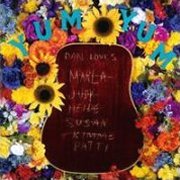 |
Dan Loves Patti (1996, 42.18) ***/T |
|
| I'm Not Telling Apiary Dan Loves Patti Doot-Doot Train of Thought Sister Cross My Heart Ring |
Jealous of the Stars Uneasy Words Will Fail Lament |
|
Current availability:
Mellotron/Chamberlin used:
When I found a copy of Dan loves Patti by Chris Holmes (not to be confused with the wholly cretinous ex-WASP guitarist), both author and title looked familiar, but it wasn't until I did a 'Net search on the man that I realised that he and Yum-Yum were one and the same. Apparently, a UK band had already used the moniker (why?) and objected strongly enough to get TAG/Atlantic to release it under Holmes' own name. I've seen his/their 'chamber pop' compared to both Bacharach and the Beach Boys, but without the complexity of either. One odd story that did the rounds was that Holmes' sincerity was somewhat questionable, to the extent that Yum-Yum were nothing more than a cynical attempt to sell records and he actually held the music in some contempt. OK, I know this is often the case, but you don't take this amount of care over something in which you don't believe; the lyrics in the CD booklet are even annotated with the guitar chords, for Chrissake!
Anyway, the music is perfectly good in that vein, although, by and large, it's not really my bowl of gruel, to be honest, although I do quite like opener I'm Not Telling. Maybe I need to listen to it some more. Whatever, Holmes plays Mellotron and/or Chamberlin on three tracks, although the only one with any really overt use is the flutes on (you guessed it) I'm Not Telling, with a block chord held on at the end of the song. The string trio (a quartet with just one violin) used right across the album confuses the issue, but I really can't hear much evidence of the Mellotron and Chamby on Cross My Heart and the Chamby on Words Will Fail, but at least there's one full-on Mellotron track.
See: Ashtar Command